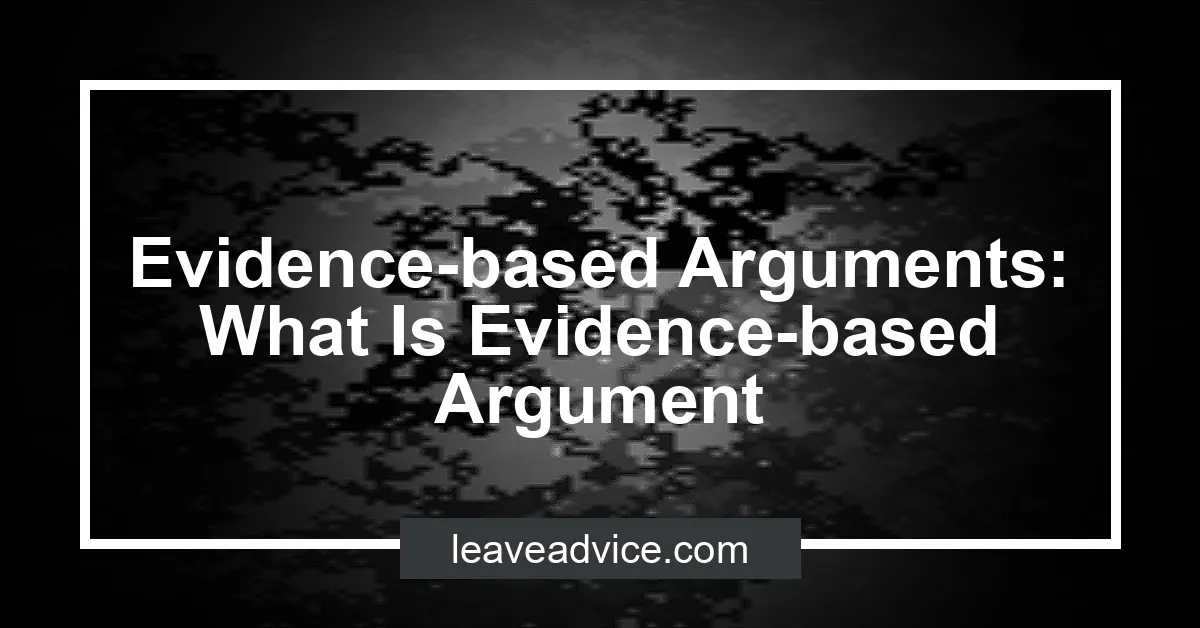Evidence-based Arguments: What Is Evidence-based Argument


Evidence-based argument is the use of logic and evidence to support a claim or viewpoint. It involves using facts, data, statistics, expert opinions, and examples to convince the reader of the validity of the writer’s argument.
It is important to use evidence-based arguments in writing because it provides reasoning behind the claim and proves its validity. This type of argumentation helps in building a strong case and persuading the reader to accept the writer’s viewpoint based on the evidence presented.
In academic writing, evidence-based arguments are essential for providing a clear stance or claim on a topic, and for supporting that claim with credible research evidence. This helps in contributing to the ongoing conversation on the topic and providing the reader with a well-supported point of view.
Check out this Youtube video: “A Visual Design for Evidence-Based Arguments – John Arthur” to gain a deeper understanding of what evidence-based argument is and how it can be visually represented in academic writing.
Understanding Evidence-based Arguments
Definition of evidence-based argument
An evidence-based argument refers to the use of logical reasoning, data, facts, statistics, expert opinions, and examples to support a claim or viewpoint. It involves building a case for a particular stance based on available evidence.
This type of argument relies on solid understanding of the material at hand and aims to convince the reader of the validity of the writer’s perspective.
Characteristics of evidence-based arguments
The key characteristics of evidence-based arguments include a strong reliance on verifiable evidence rather than emotional appeals, a logical and well-structured presentation of facts, and a clear connection between the evidence and the claim being made. Additionally, evidence-based arguments require the use of credible sources and the incorporation of different types of evidence to effectively support the writer’s position.
The role of evidence in forming arguments
Evidence plays a critical role in forming arguments by serving as the foundation upon which claims are built. It provides the reasoning behind the argument and offers the facts that substantiate the validity of the writer’s standpoint.
The use of evidence strengthens the writer’s position, enhances the credibility of the argument, and compels audiences to accept the presented claims.
| Evidence-based arguments |
|---|
| Logical reasoning |
| Verifiable evidence |
| Credible sources |
| Well-structured presentation |
| Connects evidence to claims |
Evidence-based arguments are essential in effective writing as they rely on solid reasoning, verifiable evidence, and credible sources to persuade the reader of the validity of the writer’s claim or viewpoint.
Types of Evidence in Argumentation
Statistical evidence
Statistical evidence involves using data and numbers to support an argument. For example, citing statistics about the impact of smoking on lung cancer rates can be a powerful form of evidence in a health-related argument. Statistics are often collected by reputable organizations, such as government agencies or research institutions. They provide quantifiable data that can add credibility to an argument.
Anecdotal evidence
Anecdotal evidence relies on personal experiences or individual stories to support a claim. While it may not be universally applicable, anecdotal evidence can be compelling in certain contexts. For instance, sharing personal accounts of the benefits of a certain wellness practice can add a relatable dimension to an argument, even though it may not represent a broad population.
Expert testimony
Expert testimony involves citing the opinions or insights of recognized authorities in a particular field. This type of evidence is valuable for adding credibility and depth to an argument. For example, quoting a renowned economist in a discussion about economic policy can enhance the persuasiveness of the argument.
Factual evidence
Factual evidence relies on verifiable and objective information to support a claim. This can include historical events, scientific data, or proven theories. For instance, presenting the historical timeline of a conflict to support a political analysis adds factual evidence to the argument’s foundation.
| Evidence Type | Description |
|---|---|
| Statistical evidence | Utilizes data and numbers to support an argument, often collected by reputable organizations. |
| Anecdotal evidence | Relies on personal experiences or individual stories to add a relatable dimension to an argument. |
| Expert testimony | Cites the opinions of recognized authorities in a particular field to add credibility to the argument. |
| Factual evidence | Relies on verifiable and objective information, including historical events, scientific data, or proven theories. |
The Importance of Evidence in Argumentation
Why evidence is crucial in forming strong arguments
Evidence is crucial in forming strong arguments because it provides credibility and support to the claims being made. Just like a building needs a solid foundation, a persuasive argument needs solid evidence to stand firm.
Without evidence, arguments become mere opinions, lacking the necessary backing to compel the audience to accept the claims. For instance, in a debate about climate change, presenting scientific data and research findings as evidence adds weight to the argument compared to just expressing personal beliefs.
How evidence strengthens the validity of arguments
Evidence strengthens the validity of arguments by providing substance and reliability. When backed by credible evidence, an argument gains trustworthiness, making it more convincing to the audience.
It’s like having a map to guide you through unfamiliar territory, evidence guides the audience to trust and believe in the argument being presented. For example, in a court case, witness testimony and forensic evidence are essential to proving the validity of the presented arguments.
They validate the claims being asserted and influence the audience to accept the argument as valid.
The Process of Building an Evidence-Based Argument
Identifying the Issue
Identifying the issue in building an evidence-based argument involves recognizing the core problem or topic of debate. It requires delving deep into the subject matter and understanding the multiple dimensions and perspectives surrounding it.
For example, when establishing the need for improved workplace safety measures, it’s essential to consider the specific hazards employees face and the potential consequences of not addressing them adequately.
Gathering Relevant Evidence
Gathering relevant evidence entails sourcing credible and diverse information to support the identified issue. This includes statistical data, expert opinions, case studies, and empirical research.
For instance, in the context of workplace safety, evidence could comprise injury reports, industry standards, and best practices recommended by occupational health and safety authorities.
Analyzing and Organizing Evidence
Analyzing and organizing evidence requires assessing the gathered information critically. It involves identifying patterns, strengths, and weaknesses within the evidence to classify and arrange it in a coherent manner.
For example, when assessing workplace safety, one might organize evidence based on the types of hazards, their frequency, and severity, thereby offering a structured approach to addressing each.
Constructing the Argument
Constructing the argument involves formulating a compelling and logical narrative based on the analyzed evidence. This narrative needs to clearly present the nature of the issue, the significance of the evidence, and the proposed solutions or recommendations.
In the case of workplace safety, the argument may emphasize the need for proactive measures, employee training, and the implementation of safety protocols.
Evaluating the Credibility of Evidence
Criteria for evaluating the credibility of evidence
The criteria for evaluating the credibility of evidence include timeliness, relevance, authenticity, and authoritativeness. Timeliness ensures that the information is recent and up-to-date, aligning with the latest developments.
Relevance confirms that the source is pertinent to the research topic, directly contributing to its validity. Authenticity assesses the trustworthiness and provenance of the information.
Lastly, authoritativeness establishes the expertise and reputation of the author or organization presenting the evidence.
Examples of credible and non-credible evidence
Credible evidence encompasses scholarly articles, peer-reviewed journals, government publications, and reports from reputable organizations. These sources are backed by thorough research, rigorous review processes, and expertise in the field.
Non-credible evidence includes blogs, self-authored websites, outdated materials, and unverified social media content. Such sources lack authority, may contain biased information, and often lack rigorous validation processes.
| Credible Evidence | Non-Credible Evidence |
|---|---|
| Scholarly articles | Blogs and self-authored websites |
| Peer-reviewed journals | Outdated materials |
| Government publications | Unverified social media content |
| Reports from reputable organizations |
Common Misconceptions About Evidence-Based Arguments
Addressing misconceptions about evidence-based arguments
One common misconception about evidence-based arguments is that they rely solely on quantitative data, such as statistics and numerical figures. However, evidence-based arguments encompass a broad spectrum of evidence, including qualitative data, expert opinions, and real-life examples.
By addressing this misconception, individuals can understand that evidence-based arguments are not limited to numbers and can incorporate diverse forms of evidence to support a claim.
Examples of misconceptions and clarifications
An example of a misconception is the belief that evidence-based arguments dismiss personal experiences and anecdotes as valid evidence. In reality, personal experiences can provide valuable insights and contribute to the body of evidence supporting an argument.
By clarifying this, individuals can recognize that evidence-based arguments can incorporate personal narratives alongside empirical research to enhance their persuasiveness.
The Impact of Evidence-Based Arguments
How evidence-based arguments influence decision-making
Evidence-based arguments profoundly influence decision-making by grounding it in factual, reliable information rather than subjective opinions or biased viewpoints. The utilization of evidence ensures that the choices made are based on legitimate and current insights, thus steering decisions away from being founded on fleeting trends or unsupported claims.
By relying on evidence-based arguments, decision-makers can reinforce their choices with a solid foundation of knowledge, fostering trust and reliability within their professions.
Examples of evidence-based arguments leading to change
One compelling example of evidence-based arguments leading to change can be seen in the healthcare sector, where medical professionals rely on research-based evidence to inform treatment approaches, leading to improved patient outcomes and advancements in medical practices. Additionally, evidence-based arguments have sparked policy changes in various industries, such as environmental regulations based on scientific findings, showcasing the tangible impact of evidence-driven decision-making on broader societal changes.
| Contributing Factor | Impact |
|---|---|
| Healthcare practices | Improved patient outcomes |
| Environmental regulations | Positive societal and environmental changes |
How to Counter Evidence-Based Arguments
Identifying weaknesses in evidence-based arguments
One way to counter evidence-based arguments is to first identify their weaknesses. This involves critically examining the research methods, data gathering processes, and potential biases in the evidence presented.
For instance, if a study relies heavily on self-reported data, it’s important to question the reliability of such information and the potential for subjective interpretation.
Providing counter-evidence
To counter evidence-based arguments, providing counter-evidence is essential. This involves presenting alternative research findings, studies, or data that contradict the initial evidence.
For example, if a study claims a specific correlation between two variables, presenting a separate study that disproves this correlation can effectively counter the initial argument.
Challenging the validity of evidence
Challenging the validity of evidence involves questioning the credibility of the sources, the objectivity of the researchers, and the overall reliability of the data. This can be achieved by highlighting potential conflicts of interest, methodological limitations, or flaws in the research design.
For instance, if a study’s sample size is questionable, it’s important to highlight the implications of this on the validity of the evidence.
| Weaknesses in Evidence-based Arguments | Counter-evidence | Challenging Validity of Evidence | |
|---|---|---|---|
| Example | Reliance on self-reported data | Presenting alternative research findings | Questioning the credibility of sources |
| Outcome | Highlights potential biases | Undermines the initial evidence | Raises doubts about the evidence’s reliability |
By addressing these aspects, individuals can effectively counter evidence-based arguments and contribute to a more comprehensive and balanced understanding of the topic at hand.
The Ethical Considerations in Using Evidence-Based Arguments
Integrity in presenting evidence
When it comes to integrity in presenting evidence, it’s crucial to ensure that all evidence is accurately represented without any distortion or bias. This means providing a fair and balanced presentation of the facts, without cherry-picking information to support a particular viewpoint.
It’s essential to maintain the highest standards of honesty and transparency in communicating evidence to uphold the integrity of the argument.
Avoiding manipulation of evidence for persuasive purposes
Avoiding manipulation of evidence for persuasive purposes is a core ethical consideration. It involves refraining from distorting or misrepresenting evidence to sway opinions or belief systems.
Manipulation undermines the credibility of the argument and erodes trust. Ethical arguments should prioritize the genuine presentation of evidence, steering clear of any tactics that aim to deceive or influence through deceitful means.
Historical Examples of Evidence-Based Arguments
Notable historical instances of evidence-based arguments
-
A notable historical instance of an evidence-based argument is the discovery of the heliocentric model by Nicolaus Copernicus in the 16th century. Copernicus presented compelling evidence through observations and mathematical calculations to support his argument that the Earth revolved around the Sun, challenging the existing geocentric model.
-
Another example is the theory of evolution proposed by Charles Darwin. Darwin’s evidence-based argument was supported by extensive findings from his expedition on the HMS Beagle and subsequent research, providing a comprehensive explanation for the diversity of life forms through natural selection.
Impact of evidence-based arguments on historical events
-
The impact of evidence-based arguments on historical events can be seen in the case of the trial of Galileo Galilei. Galileo’s evidence-based argument in support of the heliocentric model faced opposition from the prevailing religious and philosophical beliefs, leading to his trial by the Roman Inquisition.
Despite the adverse consequences, his argument eventually reshaped scientific thought.
-
Additionally, the evidence-based arguments put forth by the suffragettes in the late 19th and early 20th centuries played a pivotal role in the fight for women’s rights and resulted in their eventual enfranchisement. Their evidence-based advocacy for gender equality and suffrage led to significant historical and societal changes.
The Role of Evidence-Based Arguments in Policy Making
How evidence-based arguments inform policy decisions
Evidence-based arguments play a crucial role in informing policy decisions by providing a solid foundation of credible and relevant data. These arguments allow policymakers to base their decisions on factual evidence rather than solely on political or personal beliefs.
By using evidence-based arguments, policymakers can ensure that their decisions are informed by data-driven insights, leading to more effective and impactful policies that address real and pressing societal needs.
Examples of policies shaped by evidence-based arguments
One notable example of a policy shaped by evidence-based arguments is the implementation of public health regulations based on scientific research and empirical evidence. For instance, smoking bans in public spaces and regulations on harmful substances in consumer products were established as a result of evidence-based arguments that highlighted the detrimental health effects of these practices.
Another example is the development of educational policies that are informed by evidence-based research on effective teaching methods, student engagement, and academic achievement, leading to improvements in educational outcomes.
| Policy Area | Evidence-Based Influence |
|---|---|
| Public Health | Smoking bans, food safety regulations |
| Education | Curriculum development, teaching methodologies |
| Environmental | Carbon emissions regulations, wildlife conservation |
These examples demonstrate how evidence-based arguments have been instrumental in shaping policies that directly impact public health, education, and environmental conservation, among other critical areas of societal concern.
Demonstrating the Power of Evidence-Based Arguments
Case studies of successful evidence-based arguments
| Case Study | Success |
|---|---|
| Healthcare Reform | By presenting statistical evidence on the benefits of universal healthcare, convincing arguments led to policy change. |
| Climate Change Action | Through compelling data-based arguments, global attention was directed towards environmental policies and practices. |
Impact of evidence-based arguments on public opinion
Evidence-based arguments have a profound impact on public opinion, influencing perceptions, beliefs, and behaviors. For instance, well-structured arguments supported by robust evidence can sway public opinion on contentious issues, such as healthcare reform and climate change action.
When communicated effectively, evidence-based arguments have the power to shape public opinion, steer policy decisions, and foster meaningful change.
Remember: Evidence-based arguments are not just mere words; they are potent drivers of change when supported by compelling data and brought forth with conviction.
The Future of Evidence-Based Arguments
The future of evidence-based arguments lies in the evolving trends in evidence-based argumentation and the growing role of evidence in shaping opinions and decisions.
Evolving trends in evidence-based argumentation
The evolution of evidence-based argumentation is evident in the increasing emphasis on data-driven decision-making and the rise of fact-based discourse in academic and professional circles. This trend reflects a paradigm shift towards leveraging empirical evidence to substantiate claims and perspectives in diverse fields, including science, education, policy-making, and media discourse.
Scholars and professionals are increasingly embracing evidence-based argumentation as a means to enhance the credibility and effectiveness of their communication, fostering a culture of rational deliberation and informed decision-making.
The growing role of evidence in shaping opinions and decisions
Evidence is assuming an increasingly pivotal role in shaping opinions and decisions across various domains. In science education, research trends are revealing a growing emphasis on the use of evidence to support logical reasoning and scientific claims, contributing to a more robust and defensible academic discourse.
Moreover, evidence is playing a crucial role in influencing policymaking, as policymakers and researchers recognize the need to integrate empirical evidence and expert insights to devise more informed and effective policies. In the media landscape, evidence-based arguments are gaining prominence, impacting public perceptions and societal discourses.
This growing reliance on evidence underscores a fundamental shift towards more rational and substantiated dialogues that drive meaningful change and progress.
| Aspect | Description |
|---|---|
| Education | Increasing emphasis on evidence-based reasoning |
| Policy-making | Integration of empirical evidence in policymaking |
| Media | Impact of evidence-based arguments on public perceptions |
The future of evidence-based arguments is anchored in the continuous evolution of argumentation patterns and the expanding influence of evidence in informing critical decisions and societal narratives. This transformation underlines a fundamental shift towards more informed, rational, and evidence-driven dialogues that are poised to shape the trajectory of diverse fields and societal progress.
Provide feedback on this response and let me know if you need any further assistance!
Overcoming Challenges in Using Evidence-Based Arguments
Common obstacles in employing evidence-based arguments
- Resistance to Change: Many individuals resist adopting evidence-based arguments due to a fear of change and a preference for traditional methods.
- Lack of Awareness: Some people may not fully comprehend the concept of evidence-based arguments, leading to reluctance in implementing them.
- Time Constraints: Professionals often face time limitations which hinder their ability to thoroughly research and present evidence-based arguments.
Strategies for addressing challenges in presenting evidence
- Education and Training: Providing comprehensive training on the importance and methods of evidence-based arguments can overcome resistance and lack of awareness.
- Time Management: Introducing efficient research tools and techniques can help individuals manage time effectively and gather evidence without feeling overwhelmed.
- Mentorship Programs: Establishing mentorship programs where experienced professionals guide others in presenting evidence-based arguments fosters skill development and confidence.
Recommended Amazon Products for Building a Home Gym
Here’s a curated list of products that can help you build a home gym with ease. These recommendations are based on functionality, price, and reviews.
Dumbbell Set
A versatile and essential equipment for strength training. The adjustable dumbbell set allows you to easily switch between weights and perform a variety of exercises with just one piece of equipment. Check the adjustable dumbbell set on Amazon today!


Resistance Bands
Great for toning and strengthening muscles, resistance bands offer a portable and affordable way to get a full-body workout. Their versatility allows for various exercises targeting different muscle groups. Get the resistance bands on Amazon for a convenient home workout solution!


Foldable Exercise Bike
Compact and easy to store, a foldable exercise bike provides a convenient cardio option for your home gym. It’s great for getting in a low-impact workout while watching TV or listening to music. Consider the foldable exercise bike on Amazon for a space-saving fitness equipment.


Jump Rope
An affordable and effective cardio option, a jump rope is a simple yet efficient addition to your home gym. It’s great for improving endurance and can be easily stored when not in use. Check out the jump rope on Amazon for a quick and effective workout tool.


Yoga Mat
A non-slip and cushioned yoga mat is essential for yoga, Pilates, stretching, and bodyweight exercises. It provides comfort and support for various floor exercises. Consider the yoga mat on Amazon for a versatile workout surface.


Top Recommended Product for Building a Home Gym
If you’re looking for the best solution to build a home gym, we highly recommend the adjustable dumbbell set. Here’s why:
| Pros | Cons |
|---|---|
| Versatile for various exercises | Higher initial investment |
| Takes up minimal space | Requires adjustment between sets |
| Highly rated by users | May have limited weight range |
Ready to build your home gym? Check out the adjustable dumbbell set on Amazon today for the best results!
Conclusion
An evidence-based argument is a logical, well-supported reasoning that relies on verifiable evidence to support its claims. This type of argument emphasizes the use of reliable data, statistics, and research findings to persuade the audience of the validity of the argument.
Furthermore, evidence-based arguments are crucial in academic and professional settings as they provide a solid foundation for beliefs and decisions. By using concrete evidence to back up claims, individuals can strengthen their arguments and make informed judgments on various topics and issues.
Evidence-based arguments play a vital role in shaping discussions, debates, and decision-making processes by ensuring that the reasoning is rooted in credible evidence and facts. It is an effective way to present and support ideas, theories, and opinions in a convincing and persuasive manner.
Frequently Asked Questions
What is the evidence-based argument?
What is an example of evidence in an argument?
What is the definition of evidence-based reasoning?
What do you mean by evidence-based?
What are evidence-based arguments?
What is evidence argument?
What evidence is used to support their argument?
What is an example of engaging in argument from evidence?
Reference Links
- https://www.linkedin.com/advice/3/how-do-you-refine-your-argument-skills-critical-thinking
- https://www.ncbi.nlm.nih.gov/pmc/articles/PMC10297823/
- https://health-policy-systems.biomedcentral.com/articles/10.1186/1478-4505-12-34
- https://www.indeed.com/career-advice/career-development/evidence-based-decision-making




